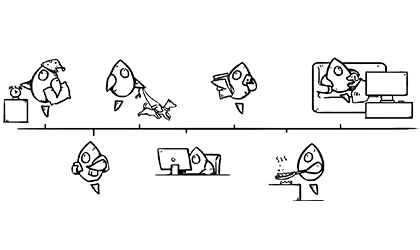MartianCraft has always been a remote company; it’s something we have both embraced and struggled against. Since our earliest beginnings in 2004 we have almost unknowingly been running a modern experiment on creating a successful remote workplace. No one ever told us that remote wasn’t supposed to work, at least not until we were well underway. We have found a way to make remote work, and work well. Our team is consistently highly productive and has time and time again delivered where others have come up short, even head-to-head against traditional teams. Our client list, portfolio, and case studies are a testament to what we have been able to accomplish together with our amazing clients.
We here at MartianCraft are experts in remote working almost above anything else. We have spoken and written about remote work and life for years. Today however we want to share something a little different. Having interviewed and hired hundreds of people for remote positions I have developed a 6th sense of what to look for in order for someone to be successful. It should come as no surprise that remote isn’t for everyone, I would estimate that only 1 out of 4 people are truly suited to work in a remote environment. The problem is that everyone wants to work remotely. No one enjoys the daily commute, being stuffed in a loud office with constant distractions, missing the important parts of their children’s lives, running errands at the worst possible times, and wearing a suit to write code (yes, that’s a thing still). There are nearly infinite factors that determine whether someone will be successful or not when working from home, however what sabotages those who otherwise should succeed is as with everything a lack of experience, be it a very specific experience that can be learned by anyone in just a few days.
Before I reveal my secret, it is worth mentioning that this is simply my opinion, although it is an opinion that is based on 13 very successful years running remote companies. I have conducted no scientific studies (spoiler: yet) and this should be considered anecdotal.
We have grown up in systems; starting in preschool and going all the way through college and beyond, everything is on a schedule. You get up and go to class or work at a specific time. This has forced us to wake up at a certain time, to take a shower at the same time, to take the dog out, etc. Everything in your entire life has been on someone else’s schedule. The time you go to bed has been dictated by the time you need to get up for work. For some of us even our weekends aren’t totally free. When we are given the freedom to work from home, perhaps even with flextime, the whole system begins to fall apart. Suddenly we are put in charge of the entire schedule: if you want to take a shower after lunch you can; if you want to eat breakfast after morning meetings you are now free to. If you want to sleep in till 2 minutes before you have to be in a meeting you can do that as well. It’s a new-found freedom, and as history has taught us, giving anyone too much freedom all at once is a terrible recipe. Like a college freshman in their first semester away from home, performance and productivity are often a problem.
Workers who are new to remote often have a hard time staying productive; being plagued by distractions in their own homes throughout the day. Maybe they take a quick break to toss some laundry in, which turns into doing the dishes and then cleaning the basement. Before you know it the day is over. I’ve seen many flextime remote workers opt for sleeping in and watching TV all morning and then struggling to switch into working mentality for the rest of the day. What separates someone who will succeed remotely and those who will crash and burn is simply what had been stolen away without you even knowing it; the routine.
Our entire lives have been structured. When you look at the click-bait articles on success secrets of startup founders or billionaires they almost without fail boil down to having a strict routine. The good news is that you can, likely for the first time in your life, design your own routine from start to finish. It may sound silly, it may even sound like “one weird trick to be successful,” but building a strict routine for your day will make you more productive, happier, and more successful.
For starters make sure that you lay out your day in hour chunks at the widest; however, breaking the day down to 30 minute, 15 minute, or even 5 minute (as Elon Musk practices) segments will result in even more productivity and structure. Here is an example of my day:
- 7:30am Alarm goes off and check phone for critical emergencies.
- 8:00am Signs of life and beginning moving and going to the bathroom.
- 8:15am Read online news, social media, Reddit, check stocks and market info.
- 9:00am Let dog out, make breakfast.
- 9:15am Eat breakfast in office, read overnight email, handle any emergencies, knock out simple tasks and email replies.
- 9:30am Beginning checking in with the team or continue handling overnight issues. Pick 3 large items/tasks that I want to finish today.
- 10am First meetings of the day are never scheduled before 10am. While working I am either in a meeting, or working through my todo list. Everything that comes in during the day goes on the todo list, throughout the day I check off as much as I can. It has never actually emptied.
- 12:30pm Lunch Break, also when I can go for a run or walk the dog.
- 1:30pm Back to the todo list.
- 3:00pm Around this time depending on meetings I will take a quick 15-30 minute break, perhaps get dinner started, toss in laundry, run out and pick up bread, etc.
- 3:30pm Back to the todo list.
- 5:00pm Last meetings of the day are scheduled here; I don’t like the plan anything later. I will also finish up anything urgent over the next hour or two and start getting things ready for tomorrow.
- 6:00pm Dinner and possibly returning to work if the pile of things to deal with is too high. 2 out of 3 times I am done for the day.
- 8:00pm Hard stop, unless something is absolutely on fire; I don’t work through the night, those days are behind me. It’s important to have at least a few hours a night to myself to relax.
- 9:00pm Phone enters “Do not Disturb” mode, I’m reachable only by a very select few.
- 12am Asleep and ready for the next day.
Try not to build a schedule that’s too inflexible, but always have something in place each day. My day is constantly being shifted around by meetings and phone calls but I try and keep the rough outline about the same.
In the next post we will look at the routines of a selection of MartianCraft team members from managers, developers, designers, and everything in between.


